Dirty Dancing – Lyric Theatre, The Star
There’s something oddly mesmerising about the fan experience, especially when it occurs in the collective, in a public space. At a Buffy the Vampire Slayer convention, people will bond with strangers by speaking in quotes and in-jokes. At a Sound of Music singalong, everyone holds their breath for a certain notorious line-reading, and explodes in laughter afterwards, en masse. And at Dirty Dancing, “the classic story on stage,” the experience is fuelled by the fervour of fandom, hyped further with nostalgia – etiquette (and theatre) be damned.
At Dirty Dancing, the audience is talkative (to each other, during scenes), disruptive (during shirtless scenes), and susceptible to bursts of applause born from recognition (“I remember that line from the movie!”) There’s a person or two who talk back to the characters, throwing some shade or sass, cheering Baby on as she dumps water down Robbie’s pants or nails a turn. When Johnny Castle says “Nobody puts Baby in a corner,” there’s a spontaneous standing ovation from dozens of audience members.
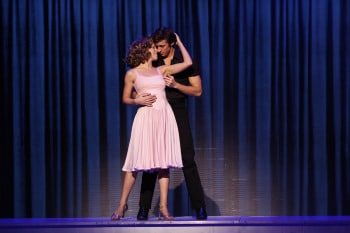
It’s like watching a film in a conference hall at a sci-fi convention. It’s like watching Monty Python at a university comedy society meeting. It’s interactive, but there’s no heart.
Dirty Dancing is not a musical, which the marketing is being careful to make clear. Dirty Dancing is a live enactment of the film. The projected backdrops are stills from the film. The songs are almost entirely from the soundtrack, which has famously sold over 40 million copies since it was released. These songs are pre-recorded masters. Occasionally, live vocals burst forth from actors playing the hired singers entertaining at Kellerman’s camp – Mark Vincent, Anna Freeland, and Eric Rasmussen. Vincent and Freeland sing ‘(I’ve Had) The Time of My Life’, and it’s a very good imitation of the song we all remember, from the Bill Medley and Jennifer Warnes release in 1987.
That’s the other thing Dirty Dancing isn’t: its own product.
Shrek is something new onstage. Heathers is something new onstage. Even An Officer and a Gentleman is something new onstage.
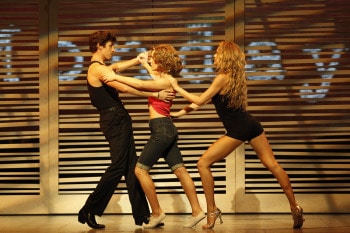
Not Dirty Dancing, though. Everything in this show wants to be, has to be, exactly like the film. The costumes match. The lines match. The voices do their best to warble just like the soundtrack warbled. God forbid anything look different, or take a risk, or experiment, or add something new to the story of Dirty Dancing.
The only new twist to the story is a lazy use of the American civil rights movement to create a nobler sense of Baby’s idealism, to vaguely measure Johnny Castle’s personal growth, and to draw painfully tone-deaf parallels between Johnny’s struggle to find a place in life in America and the systemic racial injustice, abuse, and degradation of Black Americans throughout history (something that rings even more inappropriate given recent events in the US).
It’s also annoying that the lovely lead female vocalist, Freeland, has a name according to the program – Elizabeth – and appears as a staff member at the camp, but doesn’t have a discernible storyline. That’s annoying because of course the male vocalist does. Vincent is Billy Kostecki, Johnny Castle’s cousin. He’s a character in the film. He even gets to be upset that Elizabeth dances with another man right before he soulfully, sort of, sings In the Still of the Night, and we never even see why he’d care: it’s always depressing to see a woman used primarily to advance a man’s emotional arc.
Dirty Dancing is meaningless entertainment, and would be better off not trying to convince us it has meaning. It’s a trip down memory lane for the sake of it; let’s not pretend it’s a nuanced study of 1960s America, its hopes and dreams and growing desire for social change, alongside a story of growing up, finding love, testing the waters of independence. It isn’t. This stage show is a limply directed, awkwardly blocked, tentatively explored live experience that never manages to conceal its true nature: nostalgia-driven vehicle that exists purely for commercial gain.
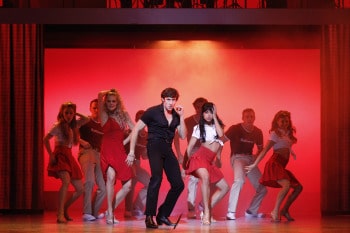
There’s no artistic merit to this show. None. But a good chunk of the audience was loving it, living for it, celebrating a story they have adored for decades.
There are good things within this show. The best thing is the leading lady. Kirby Burgess, in her first leading role, is a luminous Baby; likable, warm, and determined. She’s a brilliant dancer and is very good tracing the evolution of Baby’s dancing skill, a beginner who is a fast learner, who finds her rhythm. When her dress broke on opening night in the final dance, right before that lift, you barely noticed; she can handle anything.
Kurt Phelan is a sensitive Fonz as Johnny Castle; he swings his hips in all the right places and he’s a delightful scene partner alongside Burgess. The film’s famous lip-sync dance scene (“Oh, loverboy…”) is the show’s greatest success. Even though it moves by so quickly, the characters feel suspended in time and space, lost in their own world; their smiles are bright and adoring. It is thirty seconds of joy.
It’s a shame that Dirty Dancing wasn’t re-imagined into a musical. Love stories with a collection of quirky supporting characters, a time and place removed from the ‘real world’, with a time period that helps guide a cohesive and playful score – with a legacy of dance – could make a pretty, well danced and well sung musical. Songs would have lifted the characters into the rafters and fleshed them out, given them desperately needed depth.
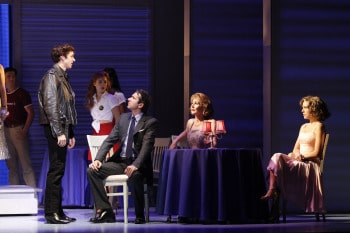
And it’s a shame that in its conversion to “the classic story on stage” it doesn’t stop to tell more of the story, or take the story a little further inward. It’s a shame that it doesn’t look at more at Baby or her father (Adam Murphy) or Penny (Nadia Coote), poor Penny, whose abandonment by her boyfriend and subsequent life-threatening abortion is just a tool to bring Baby and Johnny together – something that could have been redeemed now that we have more time and space to spend with the characters in a new vehicle.
Or we could have looked in on Baby’s sister Lisa (a charming Teagan Wouters), who returns from a meeting with Robbie (Chris Ostrenski) dishevelled and upset when he, cocksure and officially the worst, refuses to apologise for whatever just happened. “I’m sorry you had to see that,” a male character helpfully says to Baby. That kind of thing happens here but we hide it from other guests, is the context, and that’s so frustrating. Why not let Lisa be a person? Just because Baby is given a full three-dimensional characterisation, just because Robbie gets found out in the last five minutes of the show, it doesn’t let the creative team off the hook for everyone else. For such a woman-driven market, this show really doesn’t care about what women think.
Really it’s a shame that Dirty Dancing doesn’t try to be anything at all. It just wants to trade your good memories for money. There’s a market for that and there always will be a market for that, but Dirty Dancing cuts artistic value out of the equation.

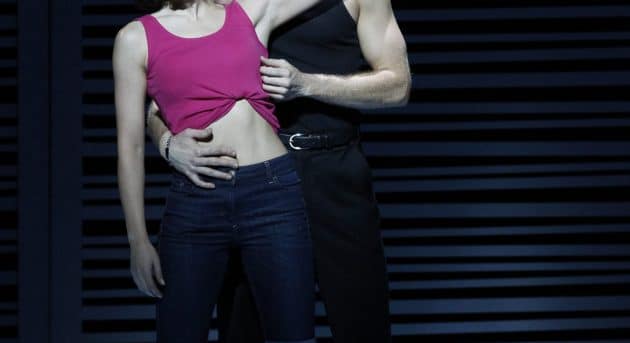



Sometimes people just want to have fun and enjoy a night of laughs and good memories, great visuals that is live and in the moment. Why is it always expected that we have to be educated or forced to see our shortcomings as humans or made to cry in despair before the entertainment can be considered “worthwhile”. It ain’t Shakespeare or Les Mis by why does it have to be? It is a fun night out,
. Hopefully Sydney audiences can get out of their habit of being told what to like and not like and go along for a fun night out and make up their own minds. It won’t be to everyone’s taste…. But really whatever is?